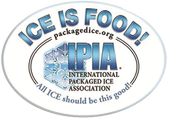|
FOR IMMEDIATE RELEASE Contact: Jane McEwen, Executive Director, IPIA (800) 742-0627 Ice produced without industry sanitation standards puts consumers at risk – A new study shows that over 25 percent of packaged ice from outdoor ice vending machines and retail producers fails to meet basic sanitation standards. Tampa, FL---In the most comprehensive and important study to ever look at the safety of packaged ice, researchers from the University of Georgia conclude that out of the millions of pounds of packaged ice produced by retailers and vending machines, a lot of this ice could put the consumer at risk. University of Georgia researchers examined the microbiological quality of packaged ice produced and bagged at retail locations—convenience stores, liquor stores, fast-food restaurants and gas stations, plus ice produced at self-serve vending machines—and compared those results with ice produced by manufacturers that comply with the International Packaged Ice Association’s (IPIA) Packaged Ice Quality Control Standards (PIQCS). It is apparent from the study results that sanitary practices in producing and packaging ice are not always followed by many retailers and vending machines. The University of Georgia study concludes with the statement: “Overall, this study indicates a need for more sanitary practices in the packaging of ice on the premises of retail locations and for cleaner vending machines.”
While researchers found that ice produced under the PIQCS standards was void of harmful bacteria, over 25 percent of the ice samples from retail store producers and self-serve vending machines showed unsatisfactory levels of contamination. Most alarmingly, samples including salmonella and E.Coli contamination. According to the report, “Consumers who buy this ice (non-IPIA) should also be educated about the risk they take by purchasing this product and ways they can also prevent cross-contamination in their homes.” The researchers continued, “No coliforms or E. Coli were detected in the ice from manufacturing plants (IPIA) which indicates good sanitary, hygienic practices may have been in place.” In response to the study, Jane McEwen, IPIA Executive Director stated, “We believe the results of the UGA study are groundbreaking. The study results demonstrate that the quality of the packaged ice produced at retail locations and self-serve vending machines is suspect and, where contamination was found, could indicate a contaminated water source, mold and slime in the ice machine, unsanitized ice scoops, unsanitary packaging process or unhygienic staff handling. We have been concerned about these unsanitary conditions for a long time and now the study results affirm it.” McEwen continued, “The flip-side of the study shows that ice manufactured to IPIA sanitary standards is clean and safe to consume.” According to Tommy Sedler, Owner of IPIA member Home City Ice, whose product was also studied by the University of Georgia, “These results are very alarming. With the research finding that over one-quarter of the non-IPIA produced ice contained unsatisfactory levels of coliforms, this proves that people may be getting sick from improperly manufactured packaged-ice, not to mention the E.coli and Salmonella hits.” Sedler added, “My company, along with other IPIA certified packaged ice companies, conducts regular microbiological testing to ensure our ice is pure and safe for our customers. Some of the retailer manufactured and vending ice that is being sold right now could really get a large number of people sick, or even worse. I hope state and federal regulators take notice of this important study and do something to protect the consumer.” Comments are closed.
|
